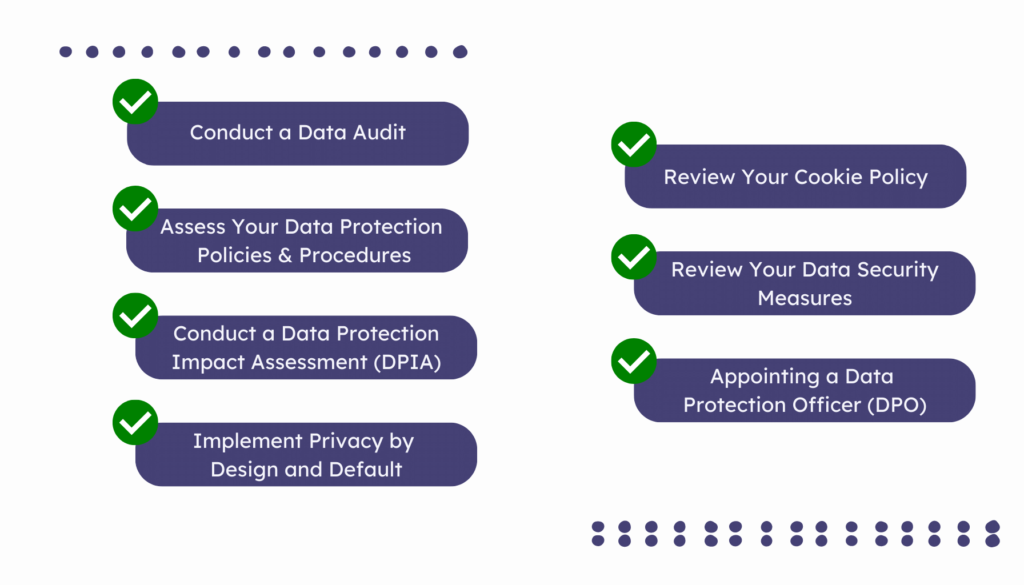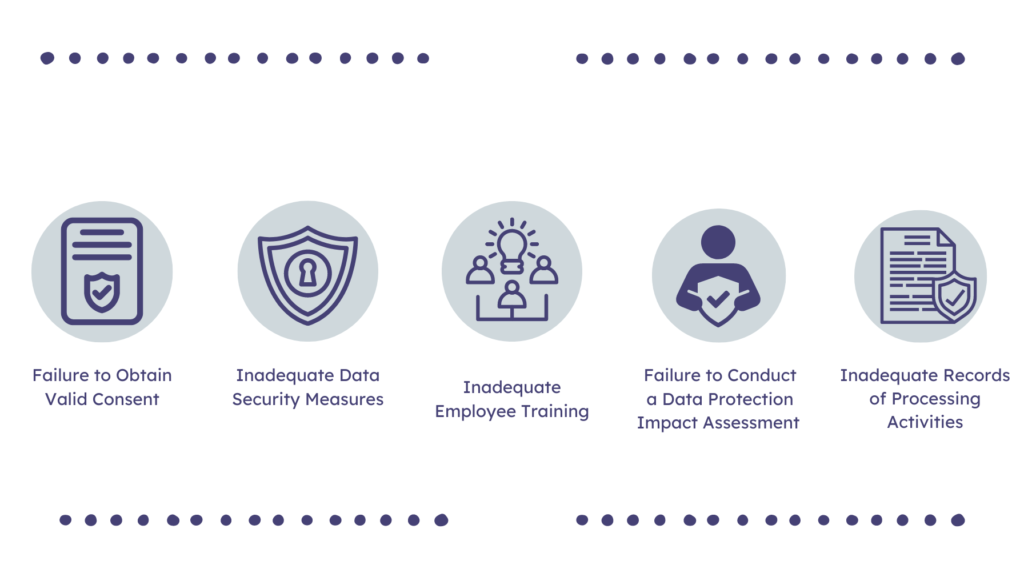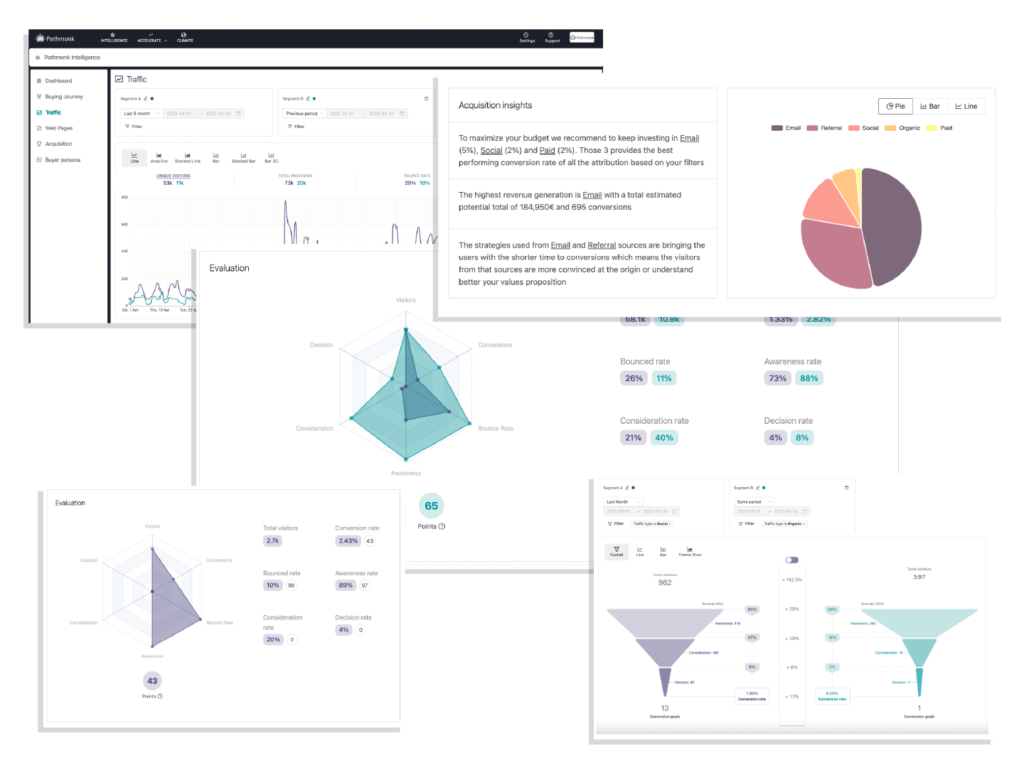Is My Website GDPR Compliant?


The General Data Protection Regulation (GDPR) is a set of rules and regulations that were introduced in 2018 to protect the personal data of individuals within the European Union (EU). It is a complex piece of legislation that has significant implications for businesses operating within the EU and those that deal with EU citizens’ data. Compliance with GDPR is mandatory for any organization that processes or stores the personal data of individuals within the EU. We’ll explore the key aspects of GDPR compliance and provide you with essential information on determining whether your website is GDPR compliant.
What is GDPR Compliance?
The General Data Protection Regulation (GDPR) was enacted on May 25, 2018. It was designed to enhance the protection of EU citizens’ personal data, and it applies to any organization, regardless of its location, that processes or stores the personal data of EU residents.
It is a set of guidelines and requirements set out in the GDPR. This includes obtaining consent from individuals to collect and process their personal data, providing individuals with the right to access, modify, and delete their personal data, implementing security measures to protect personal data, and notifying individuals in the event of a data breach.
GDPR Website Compliance Checklist
GDPR compliance requires you to implement specific technical and organizational measures to ensure the protection of personal data. We’ll provide you with a step-by-step guide on how to check if your website is GDPR compliant.
- Conduct a Data Audit: Conducting a data audit is the first step in determining whether your website is GDPR compliant. You need to identify all personal data that you process or store, where it comes from, and who you share it with. You can use tools like spreadsheets or data mapping software to help you with this task.
- Assess Your Data Protection Policies and Procedures: Once you have identified all personal data that you process or store, you need to assess your data protection policies and procedures. This assessment should include your privacy policy, data retention policies, and procedures for obtaining consent.
- Conduct a Data Protection Impact Assessment (DPIA): A DPIA is a process that helps businesses identify and minimize data protection risks. It is required when processing activities are likely to result in high risks to the rights and freedoms of individuals. You should conduct a DPIA for any new processing activity or significant change to existing processing activities.
- Implement Privacy by Design and Default: Privacy by Design and Default are two principles that require businesses to integrate data protection into their products and services from the outset. You should implement these principles when designing or updating your website.
- Review Your Cookie Policy: If your website uses cookies, you need to ensure that your cookie policy complies with GDPR requirements. You should provide users with clear and concise information about the cookies you use, their purpose, and how users can manage them.
- Review Your Data Security Measures: GDPR requires the implementation of appropriate technical and organizational measures to ensure the security of personal data. You should review your data security measures to ensure that they are adequate to protect personal data.
- Appointing a Data Protection Officer (DPO): A DPO is responsible for monitoring your compliance with GDPR and acts as a point of contact between you and the supervisory authority.
The consequences of non-compliance with GDPR are severe. Businesses that fail to comply can face fines of up to 4% of their annual global turnover or €20 million (whichever is greater). Additionally, non-compliance can lead to reputational damage, loss of customer trust, and legal action.

Tools and Resources for Assessing Your Website's GDPR Compliance
There are several tools and resources available to help you check your website’s GDPR compliance. These include:
- GDPR Compliance Checklists: Several GDPR compliance checklists are available online. These checklists can help you identify areas where your website may not be GDPR compliant.
- Privacy Policy Generators: If you need to update your privacy policy, there are privacy policy generators available. These generators can help you create a privacy policy that complies with GDPR requirements.
- Data Protection Impact Assessment (DPIA) Templates: These templates can help you conduct a DPIA and identify and mitigate data protection risks.
- Cookie Consent Tools: This can help you comply with GDPR requirements for cookie consent.
- Security Tools: These tools will help you assess your website’s security measures and identify areas for improvement.
Do I Need GDPR For My Website?
You need to be GDPR compliant for several reasons. First of all, GDPR compliance is mandatory, with significant fines and reputational damage resulting from non-compliance.
GDPR compliance will help you build trust with your customers. GDPR provides individuals with more control over their personal data, which can help you build stronger relationships with your customers. Customers are more likely to trust businesses that respect their privacy and protect their personal data.
It can help you identify and mitigate data protection risks. By conducting a DPIA and implementing appropriate technical and organizational measures, you can identify and address data protection risks before they become a problem.
As consumers become more aware of their data protection rights, they are more likely to choose businesses that respect their privacy and protect their personal data. GDPR compliance can help you stay competitive.
By implementing GDPR compliance measures, you can improve your data protection practices and enhance your overall security posture.
Common GDPR Compliance Issues
While GDPR compliance is crucial for businesses operating within the European Union (EU) or processing or storing personal data of EU citizens, it can be challenging to ensure that all aspects of GDPR compliance are met.
Some common GDPR compliance issues that businesses face include:
- Failure to Obtain Valid Consent
One of the most common GDPR compliance issues is the failure to obtain valid consent from individuals before collecting or processing their personal data. GDPR requires you to obtain explicit and informed consent from individuals before processing their personal data. To obtain valid consent, you must ensure that individuals are aware of the purpose of processing, the categories of data being processed, the rights they have in relation to their data, and how to withdraw their consent.
To address this issue, you should review your consent processes and ensure that they are in compliance with GDPR requirements. You should also maintain records of when and how consent was obtained, as well as any withdrawals of consent.
- Inadequate Data Security Measures
Another common GDPR compliance issue is the failure to implement adequate data security measures to protect personal data. GDPR requires you to implement appropriate technical and organizational measures to ensure the security of personal data. This includes measures such as encryption, access controls, and regular backups.
To address this issue, regularly review your data security measures and ensure that they are adequate to protect personal data. Also, conduct regular risk assessments to identify potential security risks and take steps to mitigate those risks.
- Inadequate Employee Training
You are required to train employees who handle personal data on data protection principles and practices. However, inadequate employee training is a common GDPR compliance issue. Employees who are not trained on GDPR requirements may inadvertently violate data protection rules, resulting in non-compliance.
Provide regular training to employees who handle personal data. Training should cover GDPR requirements, such as obtaining valid consent, data security measures, and data subject rights. Regular training will help ensure that employees understand their responsibilities for protecting personal data and complying with GDPR requirements.

- Failure to Conduct a Data Protection Impact Assessment (DPIA)
A DPIA is a process that helps businesses identify and minimize data protection risks. You are required to conduct a DPIA for any new processing activity or significant change to existing processing activities. Failure to conduct a DPIA is a common GDPR compliance issue.
Conduct a DPIA whenever required and take appropriate measures to address any identified risks. The DPIA process involves identifying potential risks, evaluating the likelihood and severity of those risks, and implementing measures to mitigate those risks.
- Inadequate Records of Processing Activities
You must maintain records of processing activities. However, inadequate records of processing activities are a common GDPR compliance issue. Inadequate records make it difficult for you to demonstrate compliance with GDPR requirements and may result in non-compliance penalties.
To address this issue, maintain accurate and up-to-date records of all processing activities. Records should include the purpose of processing, categories of data subjects, categories of personal data processed, and any third parties involved in processing activities.
Businesses That Have Faced Penalties for Non-Compliance
- Google was fined €50 million by the French data protection authority for violating GDPR requirements for transparency and consent.
- British Airways was fined £183 million by the UK Information Commissioner’s Office (ICO) for a data breach that affected 500,000 customers. The ICO found that British Airways had failed to implement adequate security measures to protect customers’ personal data.
- Marriott International was fined £99 million by the ICO for a data breach that affected 339 million customers. The ICO found that Marriott International had failed to conduct adequate due diligence when it acquired Starwood Hotels and Resorts, which had suffered the data breach.
Businesses That Have Been Recognized for Their Efforts
On the other hand, there are some companies that have been widely recognized for their effort in enforcing GDPR requirements, such as:
- Innovate Finance is a trade association representing the UK’s fintech industry. They received the “Most Effective Trade Association Campaign” award at the PR Week Awards 2019 for their campaign to promote GDPR compliance within the fintech industry. The campaign included resources and events to help members of the industry comply with GDPR regulations.
- Cohort Go is an ed-tech company that provides payment and technology solutions for international students. They received the “Excellence in International Student Experience” award at the PIEoneer Awards 2020 for their commitment to GDPR compliance and data protection. Cohort Go has implemented GDPR compliance measures to ensure the security of student data and protect the privacy rights of individuals.
Intuitive Cookieless Analytics for Your Web
Understand your customer journey, find drop-offs, and receive actionable insights with AI.

Future-Proof Your Marketing Data Privacy Compliance With Pathmonk Intelligence
As the importance of data privacy continues to grow, it’s critical that we find ways to collect and use data in a compliant manner. In pursuit of a more privacy-friendly digital world, we must consider a cookieless approach. Cookies are small pieces of data that are stored on users’ devices and can be used to track their online behavior. However, many users are becoming more privacy-conscious and are taking steps to block or delete cookies.
Going cookieless can future-proof your marketing data privacy compliance, and one tool that can help with this is Pathmonk Intelligence. Pathmonk Intelligence is a marketing automation platform that allows you to collect user data without relying on cookies. Instead, Pathmonk Intelligence uses a unique identifier to track user behavior and provide personalized content and recommendations. This approach ensures that you can comply with data privacy regulations while still collecting valuable data to improve your marketing efforts.
By going cookieless with Pathmonk Intelligence, you can improve your data privacy compliance, enhance the user experience, and gain valuable insights into user behavior. With GDPR and other data privacy regulations becoming more stringent, going cookieless is a smart way to future-proof your marketing data privacy compliance.
Conclusion
Ensuring GDPR compliance for your website is essential for protecting the privacy rights of your users and avoiding potential legal and financial penalties. By understanding the basics of GDPR compliance, checking your website for compliance issues, and implementing data protection measures, you can achieve GDPR compliance and earn the trust of your users.
Going cookieless with tools like Pathmonk Intelligence can also future-proof your marketing data privacy compliance, ensuring that you can continue to collect and use data in a compliant and ethical manner. By prioritizing GDPR compliance, you can demonstrate your commitment to data privacy and build a positive reputation among customers and stakeholders.





